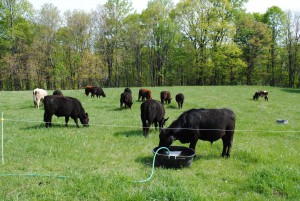As the world seeks reduction of carbon dioxide emissions, please note this scene from West Wind Farm, which depicts the ultimate in energy efficiency. Through grass, the sun’s energy is fully and productively utilized. Carbon dioxide emissions from this system of producing beef are extremely low. Furthermore, green grass is a powerful and essential factor in the bio-chemical reactions of photosynthesis and carbon sequestration, which draw carbon dioxide from the atmosphere and transfer it, through the grass plant, into pastures as soil organic carbon. This process makes the soil more fertile with higher levels of organic matter. Also throughout the year the grass has two other powers: it severely limits carbon dioxide emissions from the soil and it helps to absorb rain water and retain moisture. If widely practiced, these systems will surely help to ease Earth’s climate stress.
Managing a grassfed production system requires knowledge, skill, experience, and daily observations of both animals and grass. In the early days at West Wind Farm, we had the paddocks too big and the rest time too short. Wherever dung had fallen we saw tufts of tall, green grass surrounded by areas of short, greenish-tan grasses. Soon we learned that smaller paddocks and longer rest periods stimulated more carbon sequestration — producing high organic matter soils to nourish strong, healthy grass roots and leaves. Results after a few years were the lush pastures you see in the photo above.
My family and I are astounded to realize that in our search for fresh air and a retreat from city life, we have stumbled into a low-tech, low-cost geo-engineering system that can draw carbon from the atmosphere into our pastures and that releases only a low level of greenhouse gasses into the atmosphere. (As shown on the “West Wind Farm” page to this blog, the negative emissions of methane, and nitrous oxide at West Wind Farm were more than offset by the positive effects of carbon sequestration).
Since my education on what I now call grass power, wide reading has led me to realize that our experience at WWF is not an anomoly. There is a great deal of research and practical experience that supports the contention that organic or natural management of agriculture is an extremely important factor in the climate change debate. I recently found a very important perspective on this issue: a UN publication entitled “WAKE UP BEFORE IT IS TOO LATE: Make Agriculture Truly Sustainable Now for Food Security in a Changing Climate,” a 2013 report by UNCTAD (United Nations Conference on Trade and Development). This 321-page report strongly recommends reducing industrial agriculture and increasing organic management systems that will increase organic matter in the soils of the world. The livestock chapter recommends more research on grassland management aimed at optimizing its capacity to serve as a carbon sink and urges more support for grazing by ruminant animals, especially cattle.
Another important finding in my reading is that the US Inventory of Greenhouse Gas Emissions (April 2012) caused by agricultural activities counts only non-CO2 emissions. In Chapter 6 on agriculture, the inventory indicates agriculture makes up only 8.1% of US emissions. The CO2 emissions count is scattered in other chapters (e.g. energy, industrial processes). This accounting makes it difficult to notice that CO2 emissions from conventional corn-fed feedlot beef are very high compared to emissions from 100% organic grassfed beef. By combining non-CO2 and CO2 emissions, most knowledgeable analysts consider that agricultural activities cause 20-30% of total US greenhouse gas emissions. To fully appreciate the many benefits of grassfed and organic production systems, and to enable the incorporation of agricultural reforms in climate change mitigation strategies, GHG emissions from non-CO2 and CO2 agricultural sources must be viewed in combination.
If you would like to learn more and hopefully pursue these ideas together with me, I invite you to view, comment on, and share my power point, “Grass Power and Climate Change.”


